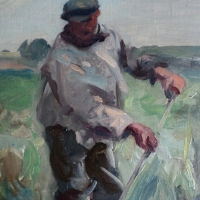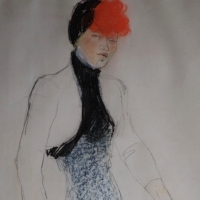Here at Blondes Fine Art we have recently helped some friends and clients' families to achieve the best value for art work they wanted to sell. Shown above are just 3 examples of work that we have purchased from private clients in the past 4 weeks. So why did they trust us to give them the highest price possible?
People sell collections for many reasons , a change of circumstances, to fund a new life adventure or perhaps you have the difficult role of distributing the wealth of a loved ones estate.
So are you thinking of selling up and sailing around the world ? What if you've suddenly become a collector not quite by choice? Maybe one day you get a call: a loved one has died and left you with their beloved painting, or a whole house full of art. What next?
If it is the latter then one of the first steps, of course, is to decide whether or not you want to keep it. Do you like the paintings or sculptures? Do you dislike the work, but love the family history tied to it? Do you like the work, but have a feeling it could be really valuable and, honestly, would rather have the money to buy something else. Do you not really have an opinion on the work, but think it may have value for a museum, art school, or historian? If you've thought it over and settled on any of the options that lead to disposing of the work, read on.
Of course, a solicitor will be involved and they usually have a close working relationship with auction houses and will advise that the best course of action, for you to get fair value for the items, is to consign to auction. But is it ? The decision is for the individual but before you take this advice perhaps you should know the facts.
It might help to begin with, to create a catalogue of the works. This can be done by you personally , the solicitor or may have already been done by your relative. Hopefully, there will be a lot of information that was already prepared but some things you'll want to know are the artist's name, titles of the work, dates when the work was created, whether or not the work has been exhibited and where, and the provenance (or history of ownership) of the piece. Take a photograph of each piece and organise everything so that someone looking into the collection can have all of the information they'd need about each work easily available in one place.
If you don't have much information and don't know much about art to determine these things yourself, or if it simply sounds too tedious, you can always hire someone else to do this for you. You may also want to ask a gallery that has knowledge of the artists concerned as they may do this for you free of charge and make sure the works are stored properly since their condition is an important factor of their value.
Once you have a better idea on the collection, do some research on the artists and works you've inherited. Most professional galleries should be able to give you advice or just get on to the web and google the artist. You will be amazed what you can find out.
Deciding Where the Collection Should Go
If it's determined that the collection has a decent value (either financially or intellectually), there are three main options to choose from: putting it up for auction, selling it to an art dealer, or gifting it to a museum or other academic collection.
Auction Versus Gallery:
Auction
- Typically, works sell for much less at an auction than with a gallery - usually 1/3rd of the true value and to add insult to injury the auction house will charge you about 30 - 40% of the hammer price for the privilege of selling it for you . So you end up with a fraction of the value of the item. The truth is that their are many low level art dealers who are termed "runners" who attend all of the auction houses and buy work up at these low values only to sell it to a gallery a few days later for a significant profit. The art business is a strangely secret world where items are bought for a few hundred pounds at auction and can sell the next month in a Mayfair gallery for hundreds of thousands and the people who loose out are those who inherited the goods and consign to auction expecting to get fair value.
- So why do solicitors advise clients to sell at auction ? The simple answer is they are just taking the easy route and are no more an expert on art than you are. It is the easy way for them to work, but they are potentially losing you a significant amount of money.
Gallery/Dealer
- If you're now leaning towards a gallery, go on-line and find dealers that specialise in the artist, region, or period your collection represents. Look for a gallery that sells similar work to what you have and is successful at doing so. Also pick up the phone and talk to them to get a good idea of how friendly they seem. Go to visit them - any professional dealer or gallerist will be happy to spend time helping you and you should expect to see some genuine interest in the work you are selling. Discuss with them your own research and tell them the price you think they are worth and why you think so. Expect them to be able to justify any valuation they give you.
- Consignment Versus Selling it Outright: If you're working with a dealer, you'll likely have the option of either selling the work directly to them or giving it to them on consignment, which means you'll be loaning the work to them without getting any money upfront and then getting a portion of the proceeds if/when the piece sells. If it's consigned the dealer won't have as much pressure to sell it if they didn't pay any money for it already, and it's possible it'll be pushed aside and never sold, so selling it outright typically gets you the better deal.
Donating
- If your works have high intellectual value, either because of their importance in art history or their place in local social history, you may want to contact museums, schools, or historians to see if they'd be interested in accepting the collection as a gift. Not only will you get the satisfaction of contributing to cultural and historical preservation, but it's also considered a tax deductible charitable donation. No matter what path you choose there are going to be tax issues to take into consideration, so it's always a good idea to involve a solicitor that specialises in managing estates, but if you decide to donate your collection these concerns get even more convoluted. You'll definitely want to hire a solicitor to help you through the process and if you engage with a gallery or dealer they may also be able to broker a payment to you for the collection as the museums can apply for lottery art fund and heritage grants.
So , is this straight forward? Is getting fair value easy? .........Clearly not, but do not just consign to auction without attempting to make contact with a specialist dealer . They will have much greater knowledge on the artwork than the auction house and you will be surprised at the good value they will give for the collection.
Trust your judgement not to the luck of the day of the auction.
If this article has raised any issues or thoughts then please do contact us here at Blondes Fine Art. We are a small family run gallery and art dealership based in Hertfordshire , England but with clients across the world.
We care about people, our reputation and our professionalism so if your circumstances have changed and you are looking to realise the cash from your much loved collection or you have the unenviable task of managing the estate of a loved one please do contact either Melanie or Mark for a chat. We pride ourselves in being approachable, but above all discreet and value our clients privacy. This and the fact that we pay the very highest prices possible and give free, honest advice is why people come to us.
Check out our 'about' pages to find out a little more about us. We look forward to hearing from you.


